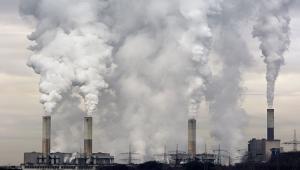On the face of it, the findings of the recent IMF report are inexplicable.
Amid incontrovertible evidence of the growing impact of climate change, and despite unprecedented public concern about the threats posed to nature and human society by a warming world, subsidies to fossil fuel production and consumption are rising. This is all the more confounding considering the mounting evidence not only of their global economic inefficiencies but also clear local economic costs.
As reported by Public Finance International, these subsidies were worth $5.2 trillion in 2017 – up from $4.7 trillion in 2015. Despite calling for the phasing out of fossil fuel subsidies at every summit since 2009, the governments of the G7 remain addicted to propping up fossil fuels – particularly in supporting exploration and production.
The IMF report identifies China and the US as the biggest culprits in 2015 (the year on which the report focuses), effectively spending $1.4trn and $649bn respectively. But even the EU – ostensibly a leader in the international fight against climate change – subsidises polluting fossil fuels to the tune of $289bn that year.
To be clear, these figures are not just the difference between what consumers pay for fuel and the market cost of supplying that fuel. They also include what are known as post-tax subsidies.
These include what consumers would pay if prices reflected the true environmental costs incurred by the fuels, such as impacts on human health from local air pollution, and the costs on society imposed by climate change.
A third component is the difference between the taxes imposed by governments on fossil fuels and those they would charge if the fuels were taxed at the same rate as other goods.
The environmental and economic case for removing these subsidies is clear. The IMF report notes that, if fuel prices had been set at fully efficient levels in 2015, estimated global CO2 emissions would have been 28% lower, fossil fuel air pollution deaths 46% lower, and governments would have collected additional tax revenues equal to 3.8% of global GDP. Net economic benefits – the environmental benefits less economic costs – would have amounted to 1.7% of global GDP.
These findings build upon compelling research demonstrating the positive economic effects of reducing subsidies, imposing carbon taxes or fees, and either returning the money directly to taxpayers as dividends, or instead re-investing it in renewable energy, clean public transport, or energy efficiency programmes.
So why are fossil fuel subsidies so persistent? Subsidies that hold down consumer prices are politically popular – although a very large share of the benefits go to high-income households.
'The fossil fuel industry is, of course, a powerful and well-funded lobby that works hard to maintain subsidies, tax breaks and other favourable treatment from government. In some countries, state-owned fossil fuel extraction creates patterns of clientelism that make reform extremely difficult.'
The fossil fuel industry is, of course, a powerful and well-funded lobby that works hard to maintain subsidies, tax breaks and other favourable treatment from government. In some countries, state-owned fossil fuel extraction creates patterns of clientelism that make reform extremely difficult.
Whether state-owned or private, the fossil fuel industry creates employment, with workers and their often powerful trade unions adding their voices to the clamour for continuing state support.
But the world is changing. The trade union movement is embracing the principles of a ‘just transition’, which aims to ensure that the interests of labour and working communities are taken into account in the transition to a low-carbon economy. Working with the trade unions to create better and more durable jobs in the emerging low-carbon economy for workers in the fossil fuel sector would defuse a powerful lobby preventing change.
The declining cost of renewables and rapid innovation in energy storage has changed the energy cost calculus. Wind and solar have become the cheapest sources of power. This is threatening the power of the fossil fuel industry, as well as promising alternative sources of employment for its workers. For countries that import fossil fuels to meet their energy needs, the case for shifting from carbon-intensive forms of energy to low-carbon ones is doubly compelling, promising to save them valuable foreign currency. Reflecting this changing reality in national policies, however, takes courage.
But the world’s politics are also changing. The growing youth climate movement is making an increasingly unarguable moral case for action on climate change, which is also convincing adult citizens to increasingly vote for climate climate. If current politicians don't have the vision to add the economic and political case to the moral case for cutting fossil fuel subsidies, their standing as politicians, let alone their claims of leadership, must be seriously called into question.
UN secretary general Antonio Guterres said it best when, last week he called for an end to subsidies for fossil fuels. ‘The idea that subsidising fossil fuels is a way to improve people’s lives could not be more wrong. We need to tax pollution not people. Fossil fuel subsidies mean using taxpayers money to boost hurricanes, spread drought and melt glaciers.’















